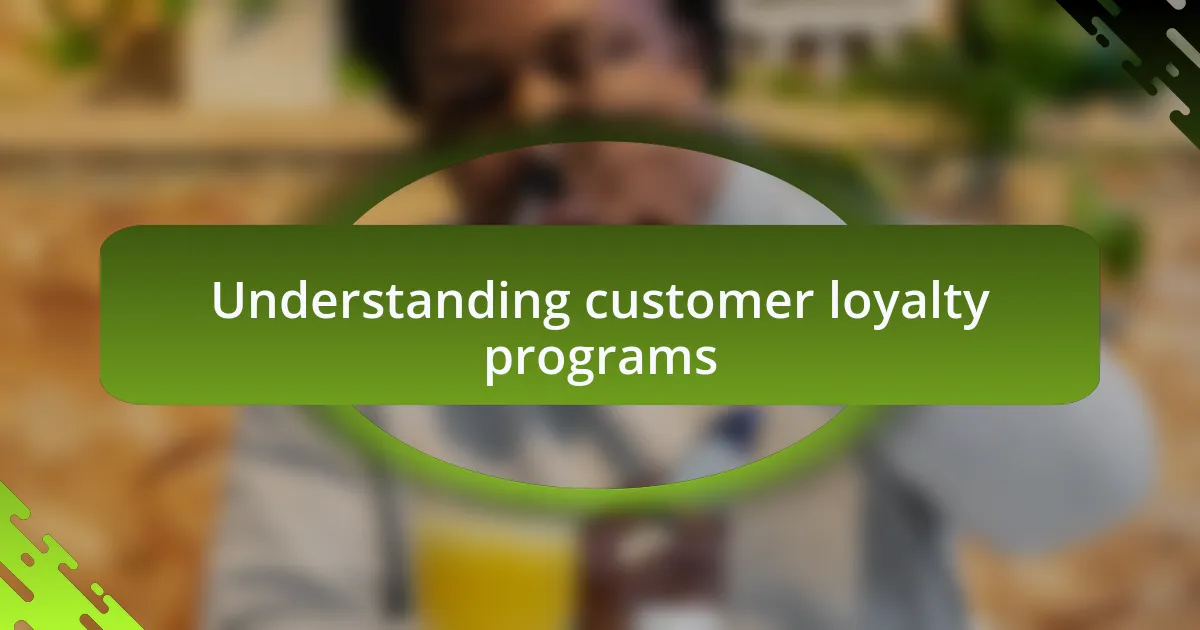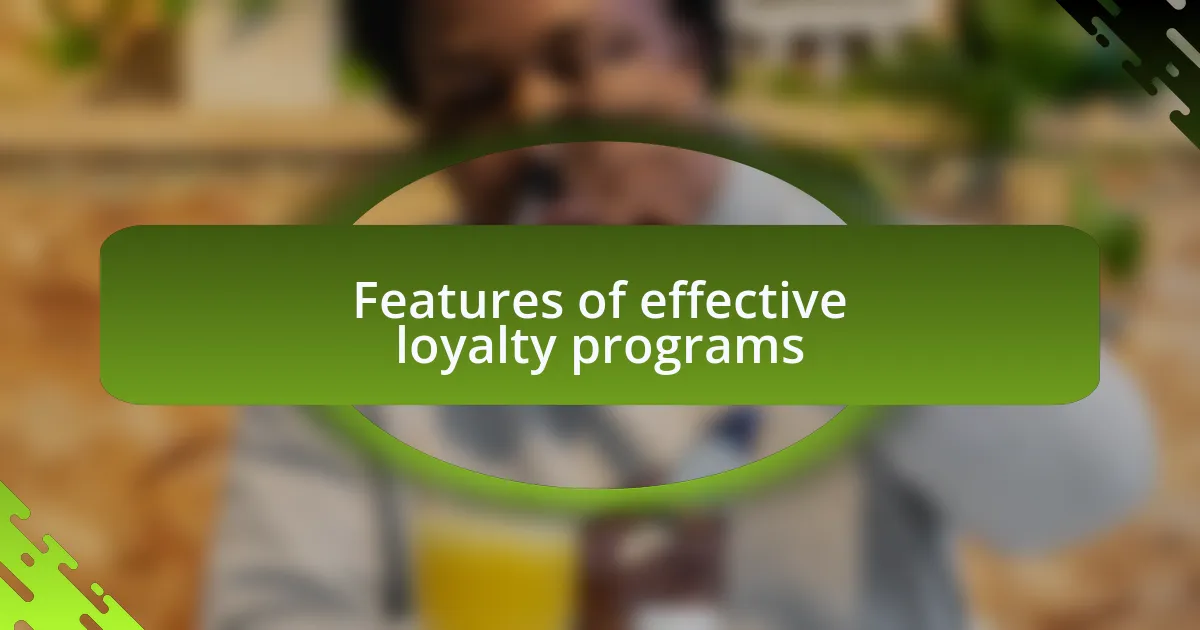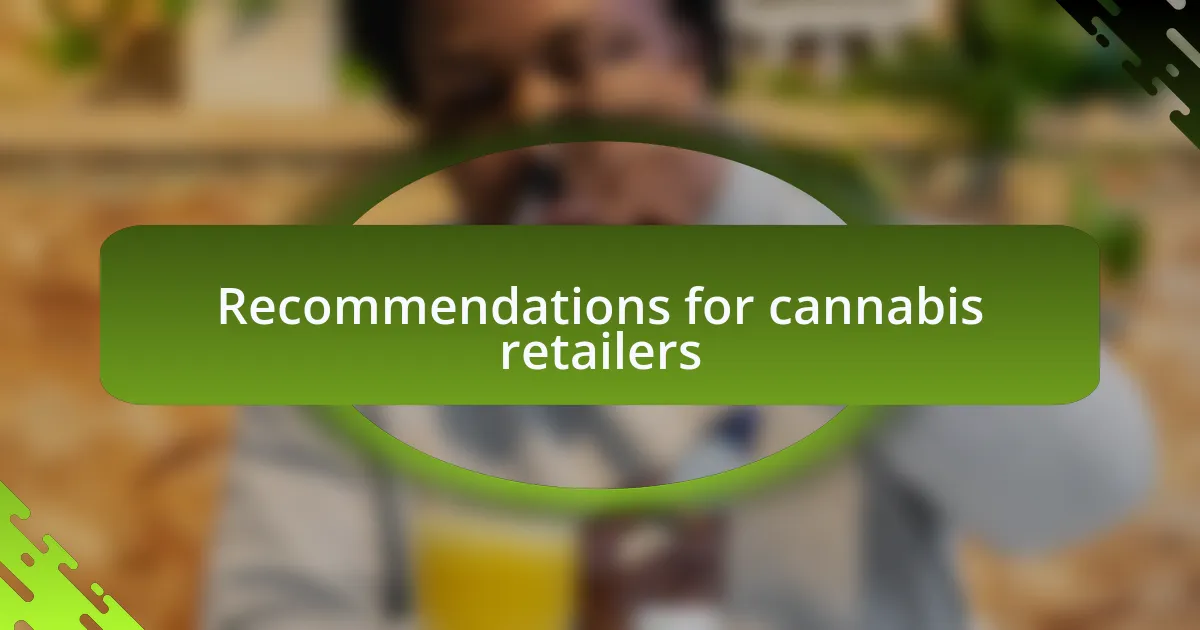Key takeaways:
- Customer loyalty programs foster long-term relationships by personalizing rewards and enhancing emotional connections with customers.
- Effective programs offer meaningful rewards, maintain ease of use, and utilize customer data to tailor offers, driving engagement and loyalty.
- Creating a sense of community and transparency around the program is vital for retaining customers and building trust.
- Incorporating customer feedback mechanisms can strengthen loyalty and turn satisfied buyers into brand advocates.

Understanding customer loyalty programs
Customer loyalty programs are essentially strategies designed to cultivate long-term relationships with customers by rewarding their repeat business. I’ve seen firsthand how these programs can transform a casual buyer into a dedicated brand advocate. Have you ever felt that little thrill when receiving points or discounts? That’s the power of loyalty programs—they create emotional connections by making customers feel valued.
One might wonder what differentiates a good loyalty program from a mediocre one. For me, it boils down to personalization. I recall visiting a cannabis dispensary that tailored their rewards to my preferences, like discounts on my favorite strains. This kind of attention not only keeps customers returning, but it also fosters a sense of belonging within the community, giving me a reason to share my positive experiences with others.
In addition to creating a sense of community, effective loyalty programs can also drive customer engagement. Think about it: when a business communicates regularly about new offers or events through their loyalty program, it keeps the brand top-of-mind. I remember participating in a program that invited me to exclusive product launches, which made me feel special and gave me an edge over the general public. Isn’t it interesting how just a few simple perks can build a bridge between a brand and its customers?

Benefits of loyalty programs
Loyalty programs offer tangible rewards, which can significantly enhance the shopping experience for customers. I once participated in a loyalty program that introduced a tier system; as I accumulated points, I moved up through levels that unlocked exclusive products and greater discounts. The anticipation of reaching the next tier added an element of excitement to every purchase, making me more likely to return.
Another key benefit of these programs is that they provide valuable data to the retailer. When I signed up for a cannabis loyalty program, I noticed the dispensary could tailor promotions based on my purchase history. This approach not only made me feel appreciated—because they recognized my preferences—but also encouraged me to try new products that matched my tastes.
Moreover, the emotional connection formed through a loyalty program can foster brand advocacy. I often find myself proudly sharing my positive experiences with friends when I feel appreciated as a customer. Don’t you think it’s remarkable how a simple reward system can turn a satisfied buyer into an enthusiastic promoter for a brand?

Features of effective loyalty programs
Effective loyalty programs thrive on meaningful rewards that resonate with customers on a personal level. I recall a time when a cannabis retailer rewarded me not just with discounts but also with exclusive access to limited-edition products. This thoughtful gesture made me feel like a valued member of their community, enhancing my emotional stake in the brand.
Another essential feature is the ease of use. Simplicity matters; I’ve seen programs where the point system was straightforward and clearly communicated. It’s frustrating when I can’t track my points easily or when redemption feels complicated. I find that a hassle-free experience encourages me to engage more frequently with the brand, ultimately bolstering my loyalty.
Personalization also plays a significant role in effective loyalty programs. I appreciate when brands take the time to understand my preferences and tailor recommendations accordingly. When I received personalized offers based on my buying patterns, it felt like the retailer was saying, “We know you,” which deepened my connection to their products. Have you ever felt that spark of recognition from a brand? It’s powerful!

Recommendations for cannabis retailers
When considering loyalty programs, cannabis retailers should focus on creating a rich community experience. I remember visiting a shop that hosted exclusive customer appreciation events for loyalty members. Those gatherings weren’t just about products – they fostered genuine connections among customers and staff, which made me eager to participate and share my passion for cannabis with others.
Another key recommendation is to maintain transparency surrounding the loyalty program. I’ve encountered programs where the rules were buried in fine print, leaving me feeling misled. When joining a loyalty program, I appreciate clear communication about how to earn points and redeem rewards. A straightforward approach builds trust and makes me more likely to engage regularly.
Lastly, incorporating feedback mechanisms can greatly enhance the program’s effectiveness. I once filled out a brief survey for a retailer, and they responded by implementing my suggestions for new product options. It felt incredibly validating to have my voice heard, reinforcing my loyalty to that brand. Have you ever felt your opinion truly mattered? That connection can significantly turn a casual customer into a devoted advocate.